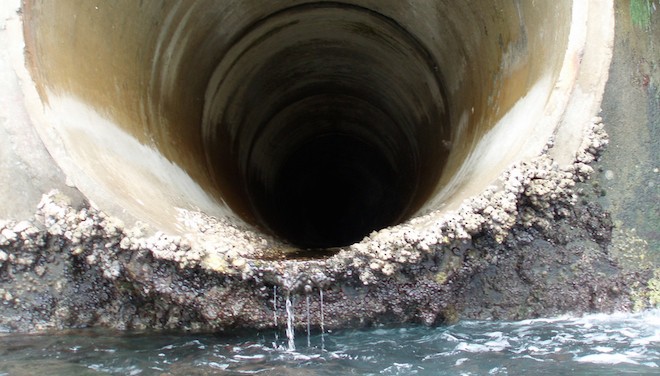
 Gerick Bergsma via Eutrophication & Hypoxia / Flickr
Gerick Bergsma via Eutrophication & Hypoxia / Flickr
Unnerving news from Brazil, now hosting travelers from all over the world because of the World Cup: The virus that causes polio has been found in sewage in one of the cities where matches are being played.
The World Health Organization, which announced the finding on Monday, says the virus was discovered last week in a sample collected in March at Viracopos International Airport in Campinas, which is about 60 miles outside Sao Paulo, and is where many of the World Cup teams have been landing. The agency said no cases of polio have been identified and there is no evidence the disease has been transmitted.
Genetic sequencing of the virus—the WHO didn’t say, but probably done by the Centers for Disease Control and Prevention in Atlanta—revealed that it was closely related to a poliovirus that recently caused a case of the disease in Equatorial Guinea in West Africa. Humans are polio’s only host; so that probably means the virus was carried into Brazil by a traveler, likely someone who never knew he was harboring it.
Brazil, like most of the rest of the world, continues to vaccinate against polio, even though there have been no cases of polio in Brazil since 1989, and the Americas were declared polio-free in 1991. The high vaccination rate — 95 percent of children nationwide, and higher than that in Sao Paulo State — kept the virus from spreading.
Still: not good.
Polio has been creeping back in Guinea; it experienced new cases in January after being free of polio since 1999, one of many Africans countries where the disease has returned after being contained. The virus was carried into Guinea from Cameroon, which was infected by migrants from Chad, which redeveloped polio as a result of vaccine refusal in Nigeria more than 10 years ago.
Though there have been only four cases in Guinea this year, the generally accepted math of polio is that each symptomatic case represents 199 other people who are not showing symptoms but are also carrying the virus and passing it on. That indicates a sizable outbreak — large enough that last week, the CDC issued a “travel notice” for Guinea, urging Americans to get a polio booster before arriving and to be careful of what they eat and drink while in the country. (Polio is spread when the virus from the gut of an infected person gets into the gut of an uninfected one. The usual method is what’s called the “fecal-oral route”: eating food or drinking water contaminated with fecal bacteria.)
Though this is just one finding, it has many important implications. Such as: It illustrates the importance of continuing to do polio surveillance — look for the presence of polio virus — even after polio is presumed to have left a country for good. (Brazil isn’t the only country to have a sewage-surveillance program; Finland, Israel and India do too. Helen Branswell wrote about them in 2011.)
Even more, though, it illustrates how unpredictable the movement of people, and their infections, can be around the world. Guinea from Cameroon: anyone who looks at a map of West Africa could have predicted that. Guinea to Brazil: probably not high on anyone’s list of probabilities.
Most of all, it underlines the daunting problem still facing the international polio eradication effort after 27 years of trying to erase the disease. Until polio is wiped out everywhere, it can be imported anywhere — and it would only take a lapse of interest in vaccination or funding for vaccine programs to get the disease started again in a country that thought its experience with polio was finished. Thus, until global eradication is achieved, countries are forced to keep vaccinating, to protect their residents against just such a random occurrence as this. There have been instances where countries who believed they were done with the disease ceased vaccinating, redirecting the money to other public health efforts. It’s fortunate Brazil did not.
(A postscript for public health geeks: It’s ironic and sad that this importation comes just weeks after the death of Dr. Ciro de Quadros, the Brazilian public health expert who was the architect of the vaccination campaign that blanketed the Americas with polio-vaccine campaigns and made them the first region of the globe to be declared polio-free.)